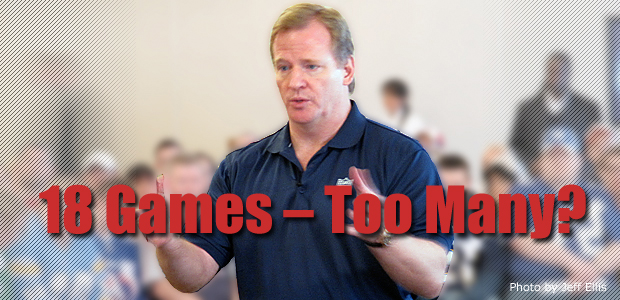
18 Game Regular Season? Less is more in the NFL
Court dates loom while the confetti has barely had a chance to settle on the field at Cowboys Stadium following Super Bowl XLV. In the aftermath of that showpiece event, those with OCD will probably have wondered, ‘who is going to clean up this mess?’ With negotiating over between the NFL and the players union, the resulting chaos and uncertainty are left in its wake. Who is going to clean up this mess? This clean-up operation is on a whole other level.
As Jeff pointed out in his last piece, there are many intricate issues which are at play in these negotiations and a quick resolution is unlikely. One of the issues currently up for a debate is the merit of an 18 game regular season. The owners are all in favour of an extended season, while the players remain opposed. It would appear that the extra two games are an inevitability. Why? Money of course. I would imagine that the owners’ thinking on this one is, ‘if less is more, just think how much more more is’.
At first blush, the arguments for an extended season seem overwhelming. The TV numbers are astronomical, dwarfing all other sports. The demand for tickets is high, and of course Jerry Jones could charge a slightly higher price on the 300 luxury suites at Cowboys Stadium currently costing around $275,000 a year, (the man’s got to eat). Furthermore, we are only talking about two extra games which at the moment only accounts for an eighth of the season; it is not a dramatic extension, and if these additional games replaced the final two preseason games, then the effect on the players would be minimised.
The main argument against extending the regular season so far focuses on the likely impact that it will have on injuries and fatigue. While this is a popular position to take, I do not see it as the most fruitful source of opposition. Injuries are a constant issue and unfortunately, due to the nature of the game, they can strike at any time. Propagators of the injury line of argument can point to the 2010 Saints team which was absolutely decimated by injuries; each game seemed to feature a new running back fresh off the street. Likewise, the Green Bay Packers and San Diego Chargers spent most of the season struggling to perform because of the players they were missing.
But the reality is that injuries vary from team to team each year. The 2009 Saints were far more fortunate in that respect and they rode their good health all the way to a Super Bowl victory. This line of argument is driven purely by the premise that additional games increase the likelihood of injuries, relying on probability and accumulated fatigue. This premise can be easily countered though. As was stated earlier, the increase of two games is not an exorbitant one. Nevertheless, precautions such as an extra bye-week and more roster spaces can provide added cover and combat exhaustion. In these circumstances an injury is just as likely in Week 1 as it is in Week 19. Let’s not forget that Tom Brady was out for effectively the entire 2008 season after picking up an injury in the season opener against the Kansas City Chiefs.
So injuries and fatigue are not the main dilemma. The major problem that an 18 game regular season poses is that it would begin to erode the illusion of parity which underpins the entire league. Of course the notion of parity is not the only reason for the NFL’s unmitigated success, but it is a huge part of the league’s allure. The NFL sells us each season on hope and the idea of “any given Sunday”. It does not matter how terrible your team was last season, there is always next year and with a good draft, smart trades and a bit of luck you never know.
Every sport does this but the NFL is the only one that can hold onto this illusion deep into the season, and it does so by limiting its regular season games. The NBA and NHL play 82 games in their regular seasons while the MLB guarantees an exhaustive 162 games for each team. For Pittsburgh Pirates fans the hope of a new season lasts until about the middle of May. At this point around 40 games will have been played and optimism will have faded into quiet despair. This is only a quarter of the way into the season, so what do Pirates fans do? They immerse themselves into the Steelers offseason and eagerly await the return of the NFL.
The fact is that the stronger teams will always rise to the top if more games are played. It is true that on any given Sunday the Carolina Panthers could beat the Green Bay Packers, but if they played on twenty Sundays back to back there is little doubt that the Packers would win the majority of these games (probably the other nineteen).
As unpredictable and crazy as the NFL can seem at times, it is not that difficult to predict which teams will be competitive each year. The demarcation between the top six teams in the league and the bottom six is colossal. This is largely down to the organisation and ownership of each franchise. It is safe to anticipate that the Patriots, Steelers and Colts will be there or thereabouts in the AFC. The same can be said for the Eagles and the Packers in the NFC. Meanwhile the Oakland Raiders and Washington Redskins have been perennial underachievers thanks in large part to their interfering and eccentric owners.
An overall Superbowl Champion is difficult to predict, but few are hitching their wagons to the NFC West. Likewise for the Buffalo Bills, Cleveland Browns, Denver Broncos and Cincinnati Bengals, even scraping a playoff berth in 2011 would be an overly ambitious target.
The real question then is what sort of quality do we anticipate in these two extra games? The latter weeks of the 2010 season saw some exhilarating matchups such as the Jets v Steelers, Eagles v Giants and the Saints v Falcons. However, as the season reaches its conclusion we are inevitably left with several teams that have nothing left to play for. The Cardinals v Panthers game in Week 15 perfectly illustrated how unwatchable and irrelevant some games can be. While a handful of late regular season games are truly “must-see”, the rest become “who saw?” The marked difference between the top and the bottom is only going to be emphasised more with a longer season. We see these differences clearly now with a shorter season. Last year in Week 16 all hope had drained away from Carolina and Buffalo. Consequently it seemed pointless for them to even play their games as they were a foregone conclusion; the Steelers beat the Panthers 27-3 (the Thursday night game) and the Patriots routed the Bills 34-3.
By around the Week 14 mark the teams at the bottom have run out of incentives to play hard. This takes its toll on morale and energy levels decrease noticeably. The statement that we, as fans, simply love American Football regardless of who is playing is an absolute fallacy. If this were true then the XFL would never have failed. The XFL, founded by Vince McMahon, intended to be a complement to the NFL by providing football in the offseason. Despite the public suffering from NFL cravings, and there being no other alternative, the XFL failed spectacularly. It lasted only one season.
Similarly, NFL Europe never really took off. Fans in Europe, who passionately support the game, were ultimately unimpressed. And again, this was despite having no alternative on their own continent. One final example, which further demonstrates this point, is Canadian Football, which has been around for 150 years this November but is still nowhere near permeating the U.S. or European markets. We don’t love any form of American Football, we only love quality American Football. The TV ratings and empty stadiums do not lie.
While parity remains a mirage, this does not mean that teams cannot surprise us in a given season. The Kansas City Chiefs remarkable revival last year saw them winning the AFC West title ahead of the highly regarded San Diego Chargers. This is evidence that sometimes a team with little hope can still achieve over the odds. But this provides further evidence of why the regular season should not be extended. After all, we are brought back to the point that the longer the season is the more likely it is that the stronger teams will rise to the top. The opportunity of two extra games makes it easier for a team like San Diego to recover from their poor start, and it makes it tougher for a ‘Cinderella team’, like the Chiefs, to hang onto their spot. The Green Bay Packers were desperately fighting for a playoff place in Week 17 and this created a frenzied and dramatic finale, translating into exciting action and amazing ratings. There are few who would argue that the Packers are not a better team than the Bears, but the combination of polarising starts and only 16 total games in the season helped to bridge the gap between the two and capture the imagination of the public.
This is why an extension of the 16 game regular season should be opposed. The trade off that the owners are looking to make actually constitutes a huge sacrifice. It is extremely short-sighted to see these additional two games as just an extra two paycheques. In the short-term that may be what they are, but in the long-term they will only serve to dilute the product of the NFL. Naturally we want to see as many games as possible, but they need to maintain their quality and appeal. If they do not, then watch those viewing figures and attendance averages gradually drop. The fewer the games, the more important they become. An 18 game season would slowly deteriorate something which has become integral to the identity of the league: its illusion of parity, its drama and its hope. In that respect, less is most certainly more.
By Ognjen Miletic




so why dont we go back to 10 games a season? Then if you lose your first 4 games (as san diego did in their super bowl season) your season would be over and your fans would not bother turning up. Your argument doesnt stack up, why did over 80,000 watch two crappy teams at wembley even when their seasons where over? Another reason to extend the games is more playing time in other countries to extend the nfl. The premier league is always under pressure to reduce its games but the fans will not let that happen even though some teams can play over 70 games with cup and european ties. Whats the problem with turning two meaningless pre season games into something were bothered about? You have to have bad teams to have good ones.
Bumblebee tuna, the very reason why Wembley was sold out when two ‘crappy’ teams were playing is because the NFL decided to limit the number of games staged there. The league initially toyed with the idea of two games but decided against it, probably realising that they wouldn’t get a full stadium for both games. I’ve been to the Wembley game, fans of all teams turn up. It has nothing to do with who is playing and everything to do with the fact that they only get one experience a year to see the NFL live. So that is an exception.
10 games is extreme, the point is to find a balance for all teams. We still love to see the great teams do well, but a cinderella team or two every year is what adds to the excitement. The premier league by the way, did reduce its games from 42 to 38 in 1995. Teams were eliminated from the league just because the product was being watered down. And that’s the premier league, which is nothing like the NFL. The NFL sells us on parity, but in the premier league the same teams are at the top every year. 3 winners in the last 16 years… Do fans of the NFL want this?
Re extra games and watered down quality, maybe look at the attendances and viewing figures for many of the group games in the Champions League when the game does not feature a ‘glamour’ club
Best piece ever written on the 18 game schedule. Don’t change what ain’t broke and be careful what you wish for. Because the guy who wrote this is bang on.
With the NFL being the most competitive professional sport in the world I don’t buy the argument that 2 more games means less quality. If you were playing 20 extra games then you could argue the quality would be decrease but the games that would be included are already being played at a 95% velocity. At the end of any season in any competitive sport you will find games being played that are meaningless but that doesn’t mean the quality is worse. To use soccer as an example the top teams in EPL are always sold out even for meaningless games at the end of the season as supporters love the opportunity to watch there team play even if the league has been won. I would expect to find more opportunities for the middle ranked teams with the extra games to bring themselves into contention for a playoff spot or for a top team to suffer a shock result and knock the confidence heading into the playoffs.
I think the point is to reduce the number of “nap” games, regardless of ticket sales. How many games are too many? I don’t know. Everyone enjoys a 30s guitar solo. How about 45s? How about 60s? Right now with 16 games, almost every snap counts. With 18 games, I predict many more snoozers.
There is a break point, however. And 18 games will take us closer to it.
How else might quality be reduced? There has been discussion of expanded rosters. This is pure dilution of talent.
I like the current system of 16 games. 16 games is enough to sort out the wheat from the chaff in my opinion and playing more games only dilutes the product. The more games you play, the less special each one is.
I’m from England the the national sport is football (soccer). The premier league plays 38 games, then there’s two different national cup competitions and two european cup compitions. I used to be a huge fan of football but I burned out on it long ago because it’s just constantly being played. There’s a three month gap between seasons and during that gap there’s either the World Cup, Euro Cup or qualifiers for the two previously mentioned competitions.
NFL has the right balance and right now. If they really want more games perhaps they should instead consider expanding each conference by adding a new division in each. Even though there would then be more games in total, each team would still only be playing 16 games and it would make each game more important as a smaller percentage of teams would make the playoffs.
Here’s a possible compromise.
As this is driven by $$$$$$$$$ let’s look at ways to maximise without affecting the product.
With the success of the International Series, how about a 17th game, neutral ground throughout the world?
Effectively, 16 games spread around the globe throughout the season.
Lose 2 pre-season games and have a second bye week.
16 games would breakdown, maybe, 2 or 3 in the UK, 1 or 2 in Ireland, 6 or 7 in mainland Europe, Mexico, Japan, Dubai,Oz…and many other places.
Now, the owners prefer home games, but the international games will make money.
Thoughts?
As awesome as it would be to have a game out here in Australia. Players don’t want to have to travel to the other side of the world to play a game.